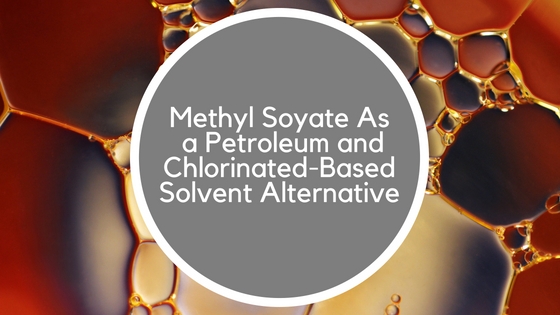[av_textblock size=” font_color=” color=” av-medium-font-size=” av-small-font-size=” av-mini-font-size=” av_uid=’av-jkinr6do’ admin_preview_bg=”]
Petroleum-Based Solvents
 Petroleum-based solvents are products derived from crude oil while chlorinated-based solvents are derived from chlorine. A few examples of such products include mineral spirits, stoddard solvent, petroleum naphtha, trichloroethane, trichlorethylene, benzene, and xylene. The main concerns centered around these solvents revolve around their environmental and health impacts. Both petroleum-based and chlorinated-based products are highly flammable and are also toxic if inhaled. Due to the reuse of the product being a hazard, all product must be disposed of which is cost-inefficient and impacts the environment negatively. Chlorinated solvents especially contaminate used oil which results in costly disposal of the solvent and the contaminated oil. Since both of the products evaporate quickly, more product will need to used which results in wasted product.
Petroleum-based solvents are products derived from crude oil while chlorinated-based solvents are derived from chlorine. A few examples of such products include mineral spirits, stoddard solvent, petroleum naphtha, trichloroethane, trichlorethylene, benzene, and xylene. The main concerns centered around these solvents revolve around their environmental and health impacts. Both petroleum-based and chlorinated-based products are highly flammable and are also toxic if inhaled. Due to the reuse of the product being a hazard, all product must be disposed of which is cost-inefficient and impacts the environment negatively. Chlorinated solvents especially contaminate used oil which results in costly disposal of the solvent and the contaminated oil. Since both of the products evaporate quickly, more product will need to used which results in wasted product.
Why switch to Methyl Soyate?
Methyl Soyate, or soy methyl ester, is produced from reacting soybean oil and methanol. Due to it being derived from a renewable oil, Methyl Soyate is also renewable and completely biodegradable. Methyl Soyate is also low in toxicity for both handling purposes and within the environment. The product is also low in VOC compare to other products within paints, coatings, and cleaning solvents. Methyl Soyate is a non-ozone depleting chemical with low flammability compared to chlorinated and petroleum products. Methyl Soyate is also compatible with other organic solvents which allows for less contamination to occur. Methyl Soyate is also low-cost due to its availability compared to biodiesels. The product has the ability to replace:
– Mineral Spirits,
– Methylene Chloride,
– Trichloroethylene,
– Methyl Ethyl Ketone (MEK),
– Toluene, and
– d-Limonene.
These other chemicals are found in wide range of products from paint strippers, cleaners, adhesives, degreasers, and carrier solvents for coatings and adhesives.
Methyl Soyate Applications
Methyl Soyate is found in several cleaning solvents and products ranging from consumer use to industrial use. One of the most beneficial uses for Methyl Soyate is for its use in the removal and recovery of spilled crude oil. The EPA also designated Methyl Soyate as a “Full Green Circle” safer chemical ingredient which awards biobased manufacturers a Safer Choice label if they use methyl soyate. The range of products methyl soyate can be found within are listed below:
- car/truck wash
- All purpose cleaning
- Degreasers
- Graffiti removal
- Heavy duty cleaning
- Industrial cleaning
- Ink cleaning
- Solvent replacements
- Resin remover
- Paint strippers
- Hand cleaners
For more information regarding Methyl Soyate or more benefits for switching to this alternative solvent, please email info@ecolink.com, or call us at (800) 563-1305.
[/av_textblock]















